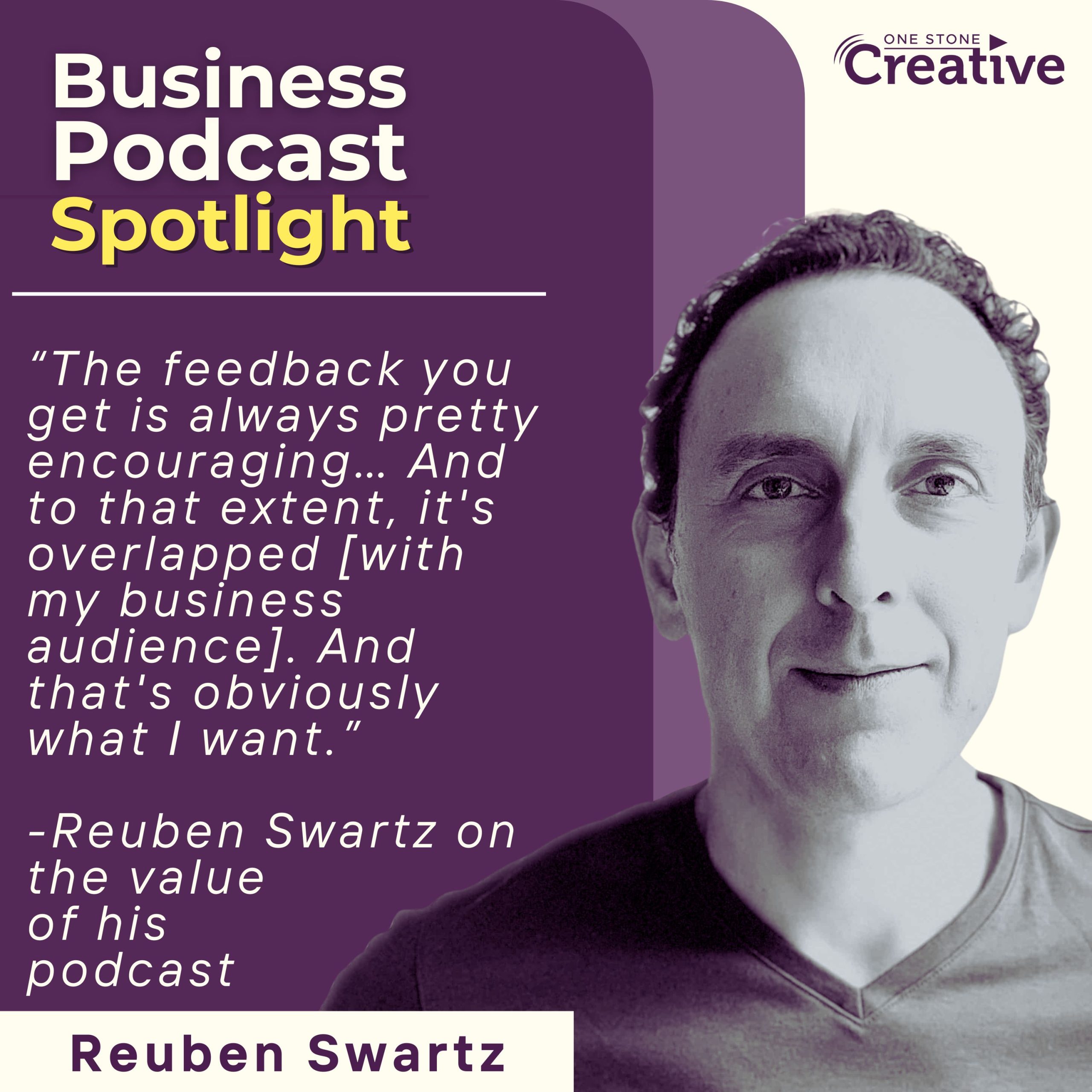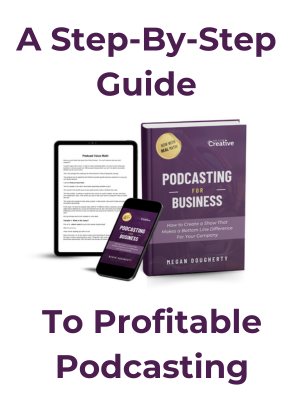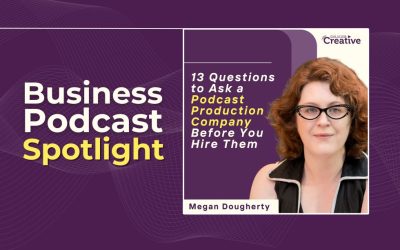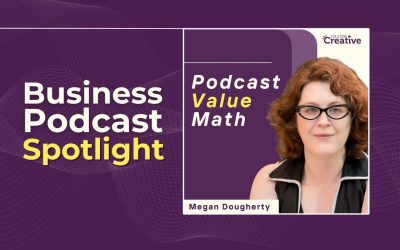Using a Podcast to Support CRM Users… and Finally Write That Book
With Megan Dougherty on the Business Podcast Spotlight
What do you do when your podcast starts to feel just a little bit stale – even though the conversations are great – but you know it could play a bigger role in connecting with your audience and supporting your broader business goals?
Listen to the Episode Now:
Subscribe on Apple Podcasts, Spotify, your your favorite other podcast player!
The Situation
When Reuben Swartz joined Megan Dougherty on the Business Podcast Spotlight – he wanted to figure out how to reinvigorate Sales for Nerds so it could better support his business and content goals. After over 100 episodes, he still enjoyed the conversations, but felt like the show wasn’t fully aligned with his business anymore. He was ready to refresh the format, bring more structure to the content, and explore how the podcast could double as a tool to serve his audience and help him finally write the book he’s been thinking about for years.
About Reuben Swartz
Reuben is the founder of Mimiran, the “anti-CRM” built specifically for solo consultants, coaches, and fractional professionals who want to grow their businesses without feeling like pushy salespeople. He’s also the host of Sales for Nerds, a podcast dedicated to helping expert service providers navigate the business development side of their work with more ease (and a little wine). Through his software, podcast, and newsletter, Reuben supports thoughtful, consultative professionals in building client relationships that actually feel good.
What’s Happened So Far

Looking at Reuben’s situation, he’s built something really special with Sales for Nerds — over 100 episodes of thoughtful, engaging conversations that his audience enjoys. But after years of podcasting, he started to feel like the spark had faded a bit, and that the show wasn’t doing quite as much for his business as it could.
Reuben originally launched the podcast as a fun way to connect with other experts, share good advice that didn’t all have to come from him, and bring value to his audience of solo consultants and service providers — and it worked. He built relationships, grew his credibility, and even got feedback from listeners who loved the mix of practical insights and relaxed, wine-accompanied chats.
But as the guest pitches rolled in and the format stayed the same, Reuben began noticing that episodes weren’t building on each other — and the structure just wasn’t supporting the kind of strategic content he wanted to create anymore. That includes a book he’s been meaning to write, but hasn’t quite started.
Now he’s reimagining what Sales for Nerds can be: a podcast with purpose, aligned with the business, designed around a structured journey that mirrors the challenges his ideal clients face.
So the new question became how to evolve a long-running podcast into a more intentional, business-driven asset.
That opened up a few other questions, too:
Can the podcast structure support the creation of a book over time?
Should solo episodes take centre stage — and do they perform better?
How can past content be reused to support future goals?
What kind of format keeps things fun and valuable for listeners?
The New Plan
As you’ll have heard in the conversation, after reviewing Reuben’s goals — creating more structured, purposeful content that aligns with his business and supports the creation of a book — we agreed that organising Sales for Nerds into themed seasons or content “chapters” is the way forward. No need to start a whole new podcast or change the brand — the existing feed and identity still have value and recognition.
The plan is to draft a rough outline that mirrors the solo consultant journey, and then use a mix of solo episodes (where Reuben shares his insights directly) and interviews (to offer varied perspectives) to build out each chapter. These episodes can be grouped visually with simple tweaks to cover art and sorted into playlists or themed pages for easy access.
This approach lets Reuben deliver high-impact, evergreen content with a clear structure — and also lays the groundwork for drafting his book in parallel.
It’s a model that’s easy to maintain, easy to share, and powerful as a lead-nurturing and authority-building tool — especially when episodes are aligned with the common struggles of his ideal clients.
It also gives him the flexibility to create focused, repeatable content for different stages of the consultant journey, while keeping things enjoyable and aligned with his voice and brand.
Business Podcast Blueprints Analysis
The new direction for Sales for Nerds is a classic Thought Leadership Podcast strategy, where the primary goal is to share Reuben’s expertise, frameworks, and insights in a structured and impactful way — while increasing the authority of both himself and his brand.
By developing themed seasons or chapter-based content, Reuben will be able to articulate his core ideas clearly, reinforce his positioning as an expert in consultative selling, and begin creating a foundation for his upcoming book. These episodes will also act as a long-term resource for his audience — giving listeners a clear path to follow and building trust along the way.
This approach will help raise Reuben’s profile, deepen the value of his existing content, and shorten the sales cycle by giving future clients a chance to experience his thinking and philosophy in advance. It will also give him a strong, high-leverage way to repurpose content across platforms.
How to Use This Strategy
So if you want to use this kind of strategy, here are a few questions to help guide your next steps:
- What core ideas, frameworks, or intellectual property do I want to be known for in my space?
- Could those ideas be organised into a “chapter-style” structure — almost like a book or a course?
- Which episodes from my existing library reflect those ideas, and which ones do I still need to create?
That structure becomes the backbone of your podcast. You can plan your content around it — alternating between solo episodes (to lay out your thinking) and interviews (to explore others’ perspectives or add expert insight). Reusing strong past episodes is absolutely allowed — just reframe them with updated context and a clear connection to your larger themes.
If you’re starting fresh, think about what you’d put in a book, workshop, or training series — the things you wish your audience understood before they came to you. These are your key episodes. Create a plan, share your ideas confidently, and you’ll be building both your authority and a content library that keeps working for you.
How to Track Success
Here are the stats you should track for this kind of podcast designed to build authority, support your audience, and contribute to a larger content project like a book:
- Listen time on themed episodes or playlists — every time someone gets a full answer from your content, that’s one less email, support message, or call you have to take.
- How often you or your team redirect people to specific episodes to answer common questions or provide onboarding — and whether that reduces time spent on repetitive support or education.
- Progress toward your long-term content goal — like a book or course. Every episode that fills a chapter or section is a visible step forward.
- Audience feedback that references your content or ideas — when listeners quote you, share an episode, or reach out because of something they heard, that means your message is landing.
And of course, if you’re curious, you can track downloads too — just remember, for this kind of strategy, impact and reuse are more valuable than raw numbers.
Connect with Reuben Swartz
Reuben is working on outlining his next podcast season — one that doubles as a content engine and the foundation for his upcoming book. He’ll be back on the Spotlight soon to share how it’s going and what he’s learned along the way. In the meantime, check out Sales for Nerds and explore Mimiran — especially if you’re a solo consultant who wants to make business development feel more natural.
You can also follow Reuben on LinkedIn and subscribe to the Sales for Nerds newsletter for thoughtful insights (and occasional wine pairings).
Are You Ready for the Spotlight?

If you have a podcast for your company, or you’re planning one in the near future, then we want to feature you!
Let’s highlight the good work you’re doing – and take your podcast to the next level.
Is Your Podcast Profitable?
One Stone Creative helps businesses build profitable podcasts that serve real business goals and make a real difference to your balance sheet - and we make it dead-simple for you and your team. If you're ready to launch or level up your show, let's talk.
Keep Learning:
How to Maximize the Value of Your Podcast Archive with Racheal Cook
How to Maximize the Value of Your Podcast Archive with Racheal CookWith Megan Dougherty on the Business Podcast SpotlightA...
13 Questions to Ask a Podcast Production Company Before You Hire Them
13 Questions to Ask a Podcast Production Company Before You Hire ThemWith Megan Dougherty on the Business Podcast...
The Formula for Profitable Podcasts
The Formula for Profitable PodcastsWith Megan Dougherty on the Business Podcast SpotlightWe’ve made it a dozen episodes...




